NYPD Carts Off Dozens of Columbia Student Protesters on Buses
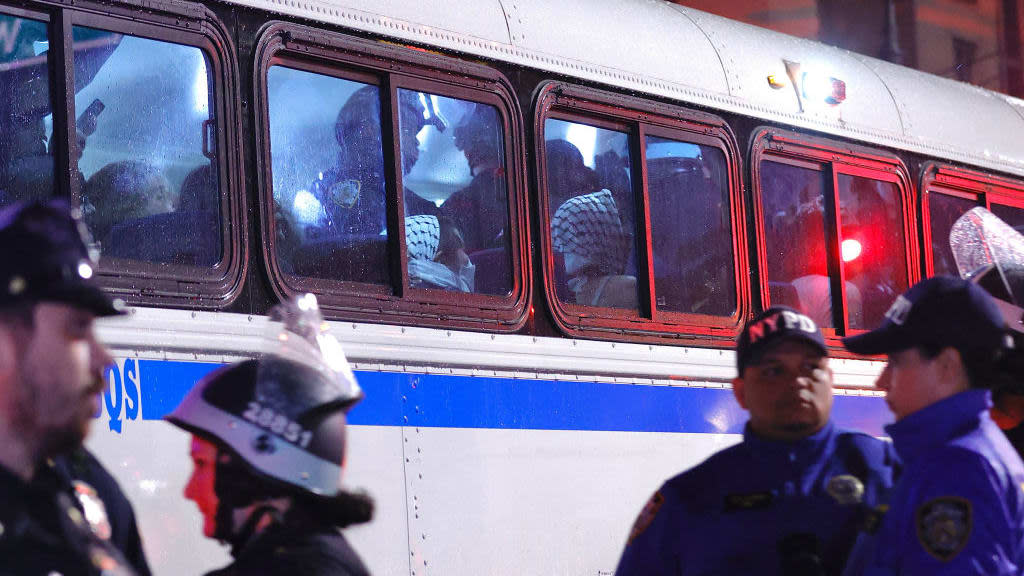
Officers in the New York Police Department entered Columbia University after sunset on Tuesday, less than 24 hours after students protesting the war in Gaza broke into and occupied a campus building, according to its student radio station and The New York Times.
Police entered Hamilton Hall through a second-story window after erecting an elevated bridge with an emergency services truck. Some ascended the ladder with their guns drawn, according to The Washington Post.
Other officers swept an all-but-abandoned encampment on a nearby lawn, shining flashlights into tents as they searched for occupants.
Around 11 p.m. local time, the New York Police Department told CNN that both Hamilton and the rest of Columbia’s campus had been cleared.
Columbia had earlier issued a campus-wide order to shelter in place.
Dozens of students were arrested and led off campus with their wrists zip-tied. As they were walked off campus and into waiting correctional buses, other protesters jeered the the police and chanted in support of Palestine. At least four other buses were on the scene.
A police representative told reporters outside campus that tear gas had not been used in the action.
“The NYPD does not use tear gas,” they said, according to the Times. The representative did acknowledge that “distraction devices” had been used, but did not elaborate.
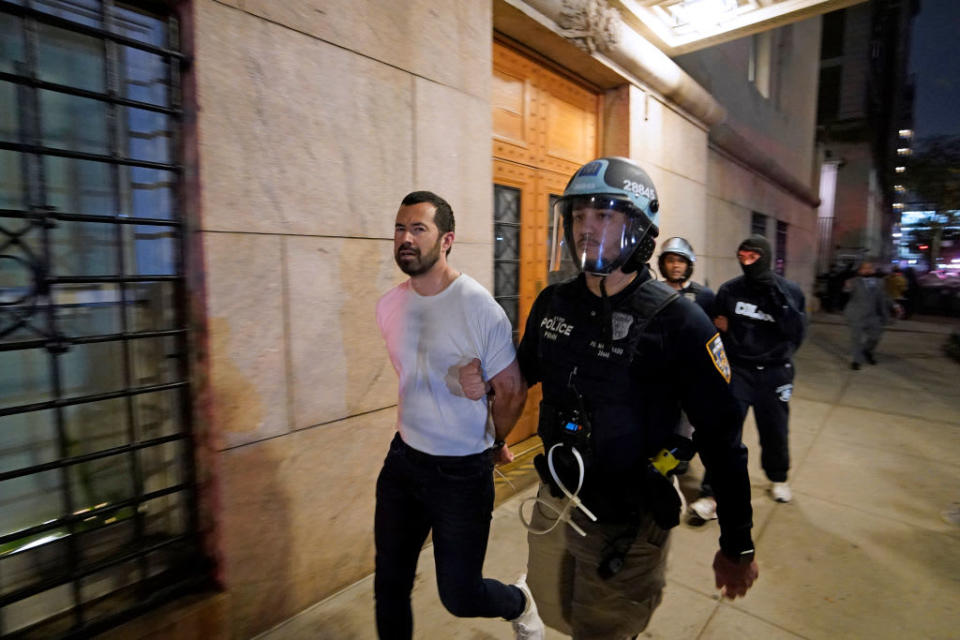
A NYPD officer arrests a student at Columbia University Tuesday night.
The university confirmed in a statement issued amid the raid that it had granted the police department the authority to enter campus.
“This decision was made to restore safety and order to our community,” a spokesperson said. “We regret that protesters have chosen to escalate the situation through their actions.”
The spokesperson said that university leadership had been left with “no choice” but to turn the matter over to law enforcement after the Hamilton occupation.
“We will not risk the safety of our community or the potential for further escalation,” they said.
Columbia President Minouche Shafik’s letter to the police authorizing their entrance began circulating on social media shortly after. It noted that law enforcement would be allowed to maintain a presence on campus until May 17, two days after the university’s planned commencement ceremony.
ON BROADWAY 113TH pic.twitter.com/uySFPv2aCe
— WKCR-FM NY (@WKCRFM) May 1, 2024
Columbia has been closed to anyone without a campus ID card for days. Tensions kicked into a higher gear on Monday, however, when the administration began suspending students involved in the protests. Protesters converged on Hamilton hours later, breaking a window and carrying metal fences inside.
“Let’s finish what they did in 1968,” one protester could be heard yelling, according to NBC News. Tuesday’s police raid took place 56 years to the day that law enforcement stormed Columbia to arrest nearly 700 students occupying several campus buildings, including Hamilton Hall. Nearly 100 people were injured.
In the university’s Tuesday night statement, the spokesperson said that “Columbia public safety personnel were forced out of the building, and a member of our facilities team was threatened,” a reference to an employee who exited the building shouting that he’d briefly been held hostage by protesters.
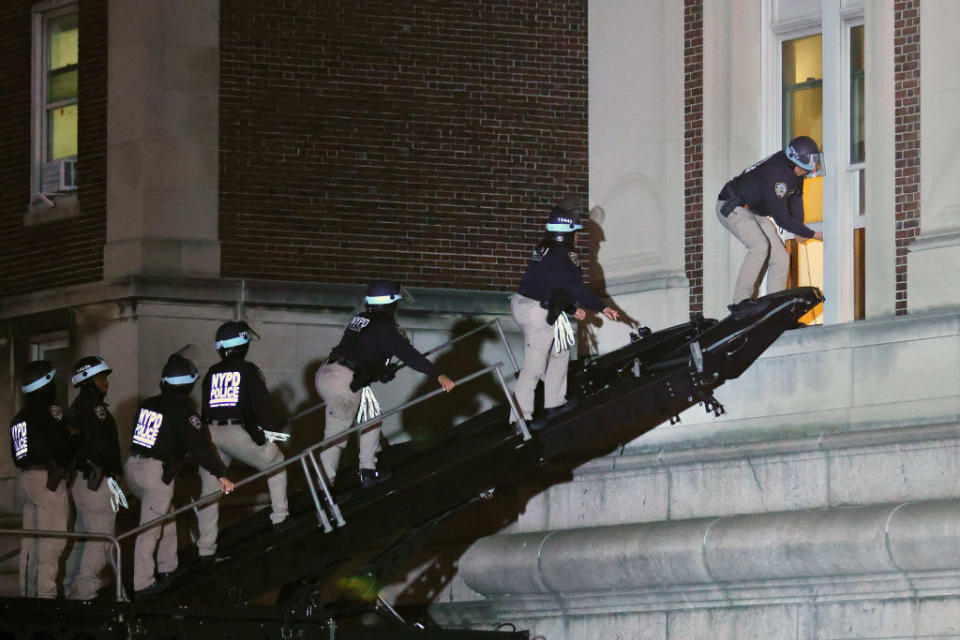
NYPD officers in riot gear break into a building at Columbia University, where pro-Palestinian students are barricaded inside and have set up an encampment.
WKCR reporters said they believed between 20 and 50 students had been inside the building when police arrived. It was not immediately clear how many arrests were being made.
Student journalists at WKCR reported that they were being forcibly herded away from the scene as officers began clearing student protesters out of he building. Several corralled into Pulitzer Hall, the home of Columbia’s journalism school, later reported that they and the school’s dean, Jelani Cobb, had been threatened with arrest should they leave the building.
Columbia’s statement noted that it believes “the group that broke into and occupied the building is led by individuals who are not affiliated with the University.” It did not offer evidence or further details.
At a news briefing hours before the raid, city authorities, including Mayor Eric Adams, similarly cast the blame for the protests and occupation at Columbia on “professional outside agitators” hellbent on creating “discord and divisiveness.” Neither Adams nor the NYPD officials who spoke identified or elaborated on the supposed outside agitators.
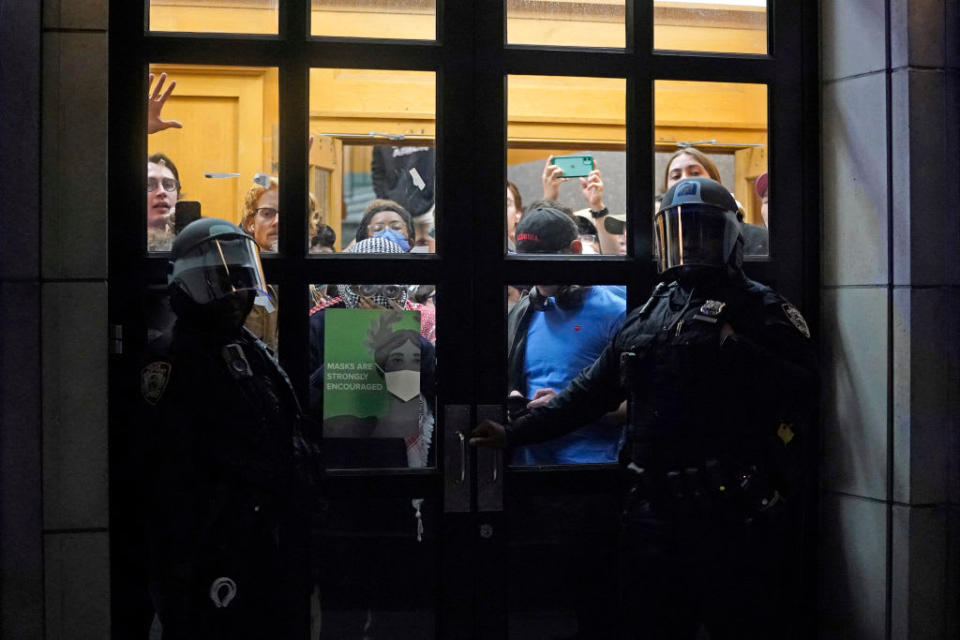
NYPD officers stand next to barricaded students at Columbia University in New York City
Earlier on Tuesday, as police in heavy riot gear gathered outside campus, Columbia faculty released a statement condemning the situation.
“Columbia faculty have attempted for the past two weeks to intervene in the situation, only to be shut out by senior University leadership,” they said. “NYPD presence in our neighborhood endangers our entire community.”
They added that Shafik, her senior staff, and the school’s board of trustees “will bear responsibility for any injuries” that might occur during the police action. It was not immediately clear if anyone had been injured in the raid.
“If any kid is hurt tonight, responsibility will fall on the mayor and univ presidents,” Rep. Alexandria Ocasio-Cortez (D-NY) tweeted. “Other leaders and schools have found a safe, de-escalatory path. This is the opposite of leadership and endangers public safety. A nightmare in the making.”
Calling on authorities to reverse course, Ocasio-Cortez was echoed by Rep. Jamaal Bowman (D-NY), who wrote on X that he was “outraged” by the police response to both Columbia and the City College of New York, where protesters tangled with police carrying pepper spray.
“The militarization of college campuses, extensive police presence, and arrest of hundreds of students are in direct opposition to the role of education as a cornerstone of our democracy,” he said.
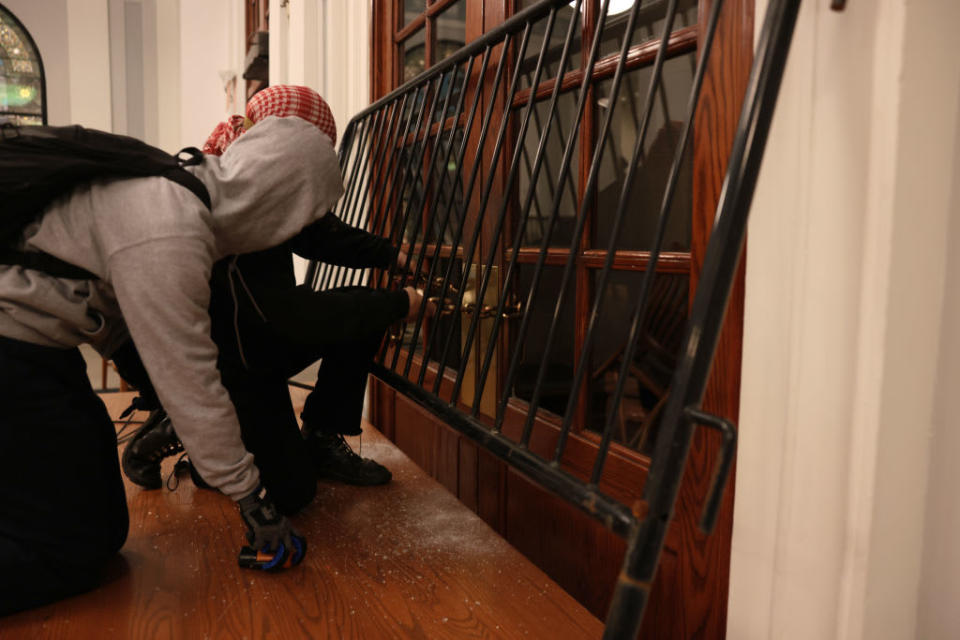
Demonstrators from the pro-Palestine encampment barricade themselves inside Hamilton Hall, an academic building at Columbia University
The establishment of Columbia’s “Gaza Solidarity Encampment” on April 17 has since inspired a wave of similar protests at universities across the country.
More than 900 students have been arrested nationwide this month, according to The Washington Post.
On many campuses, including Columbia’s, the protesters’ demands are centered around the idea that the universities should divest their endowments from companies that do business with Israel, and the weapons manufacturers that supply them with arms.
“We demand divestment,” Seuda Polat, a graduate student, said at a Monday press conference. “We will not be moved unless by force.”
Get the Daily Beast's biggest scoops and scandals delivered right to your inbox. Sign up now.
Stay informed and gain unlimited access to the Daily Beast's unmatched reporting. Subscribe now.


